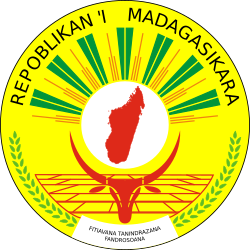Structure of government
The power of the executive branch is divided between a president who is elected by universal suffrage and a prime minister from the parliament who is nominated by his/her peers but who must be approved by the president. If the nominee for prime minister does not achieve an absolute majority of support within the parliament, the president may choose a candidate from the parliament who will serve for one year. As captured in the Malagasy concept ray aman-dreny (father and mother of the nation), enshrined in Article 44 of the constitution, the president serves as the symbol of national unity. The president also is the recognized decision maker in foreign policy and is the single most powerful person within the country. All presidential decrees must be countersigned, however, and the president is bound by the constitutional reality that the prime minister is responsible for the functioning of the government. [5]
The president is elected for a five-year period and is limited to two terms in office. In the event that no candidate wins a simple majority of the popular vote, a run-off election is held between the two leading candidates within a period of two months. The most important unwritten law regarding the executive branch revolves around the côtier/central highlands distinction. If a côtier is elected president, it is understood that a Merina will fill the position of prime minister, and vice versa. [5]
The constitution provides for a bicameral parliament composed of a Senate and a National Assembly (Assembleé Nationale). The Senate represents territorial groups and serves as the consultative chamber on social and economic issues. Two-thirds of its members are chosen by an Electoral College and the remaining one-third are chosen by the president. The National Assembly consists of 151 deputies elected by universal suffrage in one and two-member constituencies. In single-member constituencies, representatives are elected by simple majority, in the two-member constituencies, closed party lists are used, with the two seats distributed using a highest averages method. [6] [7] Both senators and deputies serve for five years. The parliament as a whole operates with a variety of classic parliamentary measures, such as the possibility of a vote of no confidence, that enable it to serve as a check on the power of the executive. [5]
A new system of local governance under the constitution is known as the Decentralized Territorial Authorities (Collectivités Territoriales Décentralisées). [5]
A strong, independent judiciary is also enshrined in the 1992 constitution. An eleven-member supreme court serves as the highest arbiter of the laws of the land. Other judicial bodies include the Administrative and Financial Constitutional Court, the Appeals Courts, tribunals and the High Court of Justice. The creation of this complex system indicates the desire of the framers of the constitution for a society built upon the rule of law. Indeed, the constitution explicitly outlines the fundamental rights of individual citizens and groups (most notably freedom of speech) and guarantees the existence of an independent press free from government control or censorship. [5]
The creation of a truly free and fair multiparty system is the centerpiece of the new constitutional order. [5]
This page is based on this
Wikipedia article Text is available under the
CC BY-SA 4.0 license; additional terms may apply.
Images, videos and audio are available under their respective licenses.
